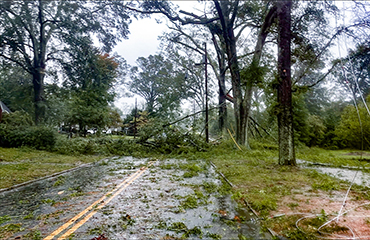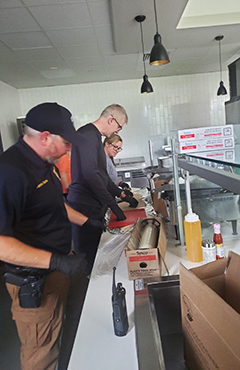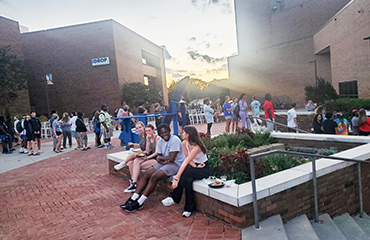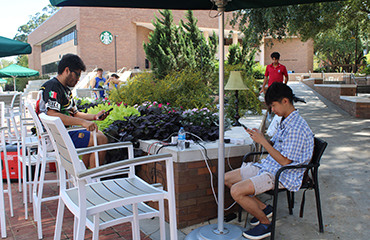
As Hurricane Helene was releasing its fury across Upstate South Carolina in the early hours of Friday, Sept. 27, Lander University police officers, administrators and essential personnel were already on campus to monitor the severity of the storm, assess damage, and ensure the safety and wellbeing of students.
When dawn revealed the unprecedented aftermath of the storm, it was apparent that the university was facing a situation unlike any in its 152-year history. Lander – and nearly 100% of Greenwood County - was completely without power. All but one entry point to campus was blocked by downed trees and power lines. Areas of flooding and scattered debris made traveling on and around the University treacherous.
“Our emergency management team had been monitoring Helene since its development in the Gulf earlier that week. We knew the storm was going to affect our state, but none of us could have imagined the extent of the damage our area would see,” said Lander President Richard Cosentino. “Our first priority was safety and making sure our students and staff, who were responding to the disaster, were taken care of in those early hours and days of need.”
To accomplish this, the University activated its own version of the Incident Command System (ICS), a nationally recognized, standardized approach to incident management that was created in 2003 following the 9/11 terrorist attacks. The system provides functional structure for actively managing many different types of incidents facing responders, said Joe Greenthal, Lander vice president for Finance & Administration.
“This structure enabled us to provide operational efficiencies and consistent messaging while preventing the duplication of efforts across all major functions,” Greenthal said. “We have used this system throughout the different phases of our disaster recovery, and it has been an effective way for many areas of our operation to work.”
In the hours immediately after the storm, widespread damage and downed trees throughout the region created a unique challenge for the University’s ICS operations: Many essential employees were unable to reach campus. The few who could make it were left with the enormous task of caring for approximately 1,500 residential students. Among the first orders of business that first Friday were feeding those students, checking on their housing, and addressing the most severe damage on campus, Greenthal said.

A skeleton crew from Lander’s Dining Services joined President Cosentino, First Lady Jessica Cosentino, several vice presidents, staff and LUPD officers to prepare to-go boxes for students from available food and products accessible in a kitchen without power. Portable generators were quickly put into service, and the same employees who served lunch began preparations for the dinner meal.
“We had one grill operating with a generator, and we emptied out the campus Starbucks, Chick-fil-A and other venues to provide a ‘build a bear’ meal,’” said Dr. Todd Gambill, vice president for Enrollment and Access Management. “Our students were patient and thankful for the meal - even if it was makeshift. In a challenging situation, they truly showed the Bearcat spirit that makes our University community so special.”
As Friday gave way to Saturday, the University made the decision to close campus and cancel classes until power could be restored to residence halls and campus facilities. Students who were able to safely travel were encouraged to return home. However, without the ability to find gasoline or travel on impassable roads, many hundreds of students were unable to leave in the first days after the storm.
In the days that followed, the ICS team and essential staff focused on caring for the remaining students and providing necessary services and support to ensure their wellbeing. Health and counseling services were made available, as were laundry and shower facilities, and shuttle transportation to and from campus for meals. The plaza was converted into a camp of sorts, where students could eat, hang out with friends, take part in activities and charge their devices, even by lamplight after nightfall. Housing staff and volunteers walked residence halls daily, knocking on every door to check on students inside. Names and room numbers were collected at each meal to create a comprehensive list of students still on campus and which meals they attended.
“This was important because it helped us answer questions from parents, who were eager to reach their children,” said Dr. Amanda Darden, the University’s vice president for Student Experience & Quality Assurance. “Staff used this time to ask students how they were doing and to learn which needs should be addressed. Our students were remarkably grateful and gracious to Lander and dining services staff.”
After nearly four days in the dark, there was light. A few buildings were reenergized on Monday, Sept. 30, with the rest of campus coming back online gradually through Wednesday, Oct. 9. Throughout this time, Lander’s essential employees – many of whom were without power at their own homes -- worked diligently to restore the campus, with the goal of bringing students and employees back as soon as possible.

But the process was tedious. As each building came online, teams had to examine and address safety issues and identify needed repairs. This included removing damaged carpets and ceiling tiles, drying out flooded areas, patching windows and roofs, and bringing tech and security systems back up. The restoration of power itself could create additional damage that had to be fixed before buildings could be occupied.
As these repairs were made, the University continued to provide information to campus and the community regarding its operations, classes and available student services. Human Resources also made calls to employees to check on their wellbeing and address any concerns they had about their ability to return to work.
Finally, on Oct. 7, the University announced it was ready to resume classes virtually on Thursday, Oct. 10, with a full return to in-person instruction on Wed., Oct. 16, following Fall Break.
The key to recovery has been the University’s commitment to communication and delegation of responsibilities from the outset of the disaster. “People worked together instead of working over each other,” Greenthal said. “We had a clear understanding of needs and responsibilities in place every day.”
Another element was the outpouring of support from the community. Businesses, organizations and churches provided donations of food and essential supplies, not only to Lander but to the surrounding neighborhoods where many Lander students and employees live.

“Lander University is deeply grateful for the compassion and support shown by so many for our students, our employees and our Greenwood neighbors,” President Cosentino said. “There is a great sense of relief that we can return to the classroom this week, but we also recognize that many who were impacted by this storm have a long journey ahead of them. Our thoughts remain with them.”
Cosentino said he was proud of the strength and adaptability the Lander community has displayed throughout this ordeal. “The disruption to our students’ daily lives – and to their academic journey – has not been easy. But the resilience among our students in the face of adversity has been nothing short of inspiring, as is the determination of our employees to work against great odds to recover from the disaster.”
Acknowledging the tremendous work that has been done over the last 19 days to restore the campus to pre-Helene conditions, Cosentino added, “We are ready to provide our students with the quality academic and student life experiences that they expect and deserve.
“Lander will continue to overcome any challenges that may come our way, and we will make the most of the opportunities ahead.”
Hurricane Helene Web Slideshow by University Relations